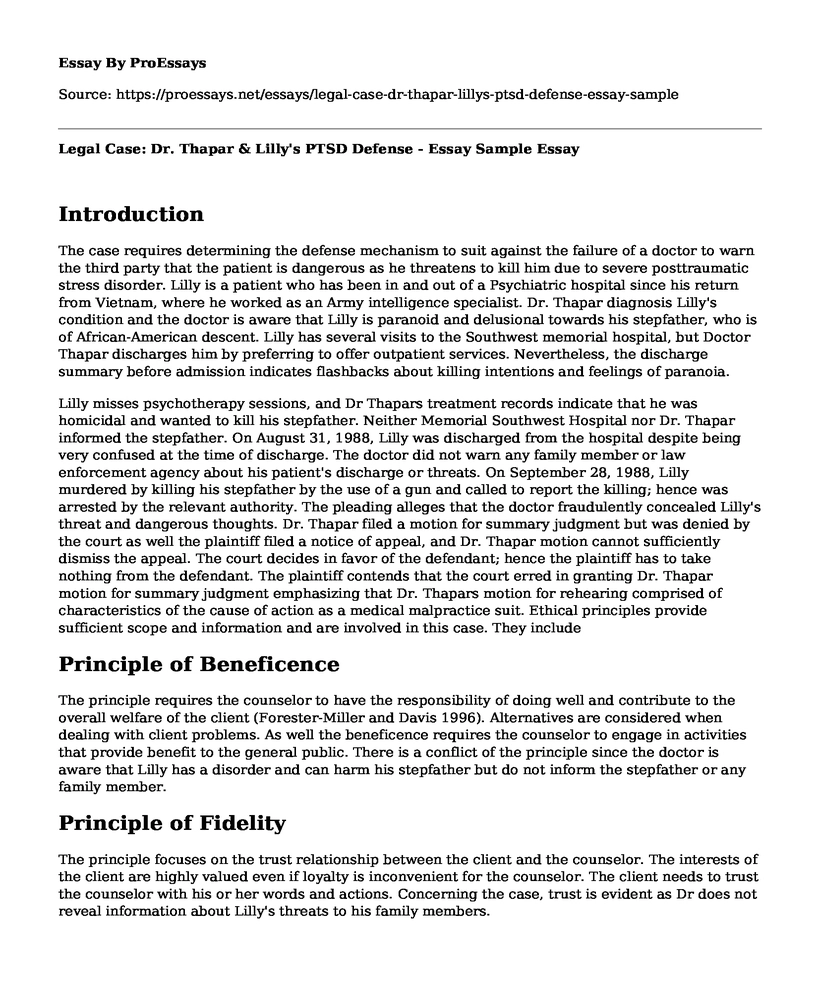Introduction
The case requires determining the defense mechanism to suit against the failure of a doctor to warn the third party that the patient is dangerous as he threatens to kill him due to severe posttraumatic stress disorder. Lilly is a patient who has been in and out of a Psychiatric hospital since his return from Vietnam, where he worked as an Army intelligence specialist. Dr. Thapar diagnosis Lilly's condition and the doctor is aware that Lilly is paranoid and delusional towards his stepfather, who is of African-American descent. Lilly has several visits to the Southwest memorial hospital, but Doctor Thapar discharges him by preferring to offer outpatient services. Nevertheless, the discharge summary before admission indicates flashbacks about killing intentions and feelings of paranoia.
Lilly misses psychotherapy sessions, and Dr Thapars treatment records indicate that he was homicidal and wanted to kill his stepfather. Neither Memorial Southwest Hospital nor Dr. Thapar informed the stepfather. On August 31, 1988, Lilly was discharged from the hospital despite being very confused at the time of discharge. The doctor did not warn any family member or law enforcement agency about his patient's discharge or threats. On September 28, 1988, Lilly murdered by killing his stepfather by the use of a gun and called to report the killing; hence was arrested by the relevant authority. The pleading alleges that the doctor fraudulently concealed Lilly's threat and dangerous thoughts. Dr. Thapar filed a motion for summary judgment but was denied by the court as well the plaintiff filed a notice of appeal, and Dr. Thapar motion cannot sufficiently dismiss the appeal. The court decides in favor of the defendant; hence the plaintiff has to take nothing from the defendant. The plaintiff contends that the court erred in granting Dr. Thapar motion for summary judgment emphasizing that Dr. Thapars motion for rehearing comprised of characteristics of the cause of action as a medical malpractice suit. Ethical principles provide sufficient scope and information and are involved in this case. They include
Principle of Beneficence
The principle requires the counselor to have the responsibility of doing well and contribute to the overall welfare of the client (Forester-Miller and Davis 1996). Alternatives are considered when dealing with client problems. As well the beneficence requires the counselor to engage in activities that provide benefit to the general public. There is a conflict of the principle since the doctor is aware that Lilly has a disorder and can harm his stepfather but do not inform the stepfather or any family member.
Principle of Fidelity
The principle focuses on the trust relationship between the client and the counselor. The interests of the client are highly valued even if loyalty is inconvenient for the counselor. The client needs to trust the counselor with his or her words and actions. Concerning the case, trust is evident as Dr does not reveal information about Lilly's threats to his family members.
Justice
Justice requires actions of fairness or just manner. It requires efforts of nondiscriminatory manner to groups as well as individuals. It is reflected in the court's decision of first declining Dr. Thapar's summary judgment motion.
Various options may have been undertaken and have potential consequences for the individuals involved. For instance, if Dr. Thapar had informed the family about threats of the patient, then necessary steps could be undertaken to prevent the murder of the stepfather. The hospital could make another option since it had a record of the patient assessment before discharge by information relevant agency upon dismissing of the patient from the hospital. The court takes an act of emphasizing that there is no doctor-patient relationship by granting Dr. Thapar motion for summary judgment and finding out that Dr. Thapar has no duty to Lilly's stepfather. The plaintiff views the case as medical malpractice and alleges that the defendant's doctor was negligent in failing to warn the plaintiff decedent.
Concerning the court judgment, indeed, there is no doctor-patient relationship, and the doctor had no duty of informing the family about the threats since he had a responsibility to attend the client through the sessions and ensure confidentiality is achieved. I agree with the judgment being granted that the plaintiff takes nothing from the defendant and that the decision is entered in favor of the defendant Renu K Thapar. The affirmative that Dr. Thapar had no doctor-patient relationship to the third party is not a defense to the cause of action that is pled by the plaintiff.
Doctor's patient relationship of paramount importance in the medical field. Principles of a counselor must be adhered to avoid conflict of the ethical tenets by doctors when executing their duties to the clients. This will reduce cases of negligence as per the rules as the doctor can have a defense mechanism in the circumstance of a situation. They include the principle of fidelity, beneficence, justice, respect of autonomy, and non-maleficence.
Reference
Resource: Renu Thapar, M.D. v. Lyndall Zezulka, 1998
Cite this page
Legal Case: Dr. Thapar & Lilly's PTSD Defense - Essay Sample. (2023, May 15). Retrieved from https://proessays.net/essays/legal-case-dr-thapar-lillys-ptsd-defense-essay-sample
If you are the original author of this essay and no longer wish to have it published on the ProEssays website, please click below to request its removal:
- Aging in America - Paper Example
- The Yellow Wallpaper: The Effects of Postpartum Depression of Women
- Is Depression Affected by Gender? Essay Example
- Teaching Young People Stress Management: The Benefits of Social-Emotional Learning (SEL) - Essay Sample
- Essay Sample on The Search for a Theory of Happiness: A Historical Journey
- Speech Example on Overcoming Anxiety: Why Most Don't Seek Help
- Paper Sample on Social Situated Cognition: A Consequence of Immediate Contact







